英语注释部分句型
闽教版四年级英语上册Unit 6《Meals》单元分析 文化和语言注释

Unit 6《Meals》单元分析文化和语言注释1.meal 意思是“膳食”、“一餐”。
three meals a day意思是“一日三餐”,a light meal意思是“便餐”,a square meal 意思是“丰盛的一餐”。
2.Breakfast is ready.(早饭准备好了。
)ready 是形容词,意思是“准备好的”,作表语用。
如Are you ready?(你准备好了吗?)We are ready to go.(我们已准备好,可以走了。
)3.What’s for breakfast?(早餐吃什么?)for 是介词,在上句中的意思是“供……用的”。
for有很多不同的含义,翻译时比较灵活。
如(1)for表示“给予某人”:This is a present for you.(这是给你的礼物。
)(2)for表示“对于……而言”:And they are good for you.(它们对你有好处。
)(3)for 表示“目的”:This is a cake for her birthday.(这是为她的生日准备的蛋糕。
)k,bread,beef 是不可数名词。
不可数名词指不能以数目来计算,不可以分成个体的概念、状态、品质、感情或表示物质材料的东西;不可数名词一般没有复数形式,只有单数形式,它的前面不能使用冠词a/an。
抽象名词、物质名词和专有名词一般是不可数名词。
5.tomatoes,potatoes 分别是可数名词tomato和potato的复数形式。
可数名词指能以数目来计算,可以分成个体的人或东西,因此它有单数和复数形式。
可数名词的复数形式通常在词尾加上s 或es,规则如下(1)一般情况下名词复数在词尾加s,如:apple—apples,egg—eggs 等。
(2)以o结尾的名词,复数形式大多加es,但也有部分加s,如:tomato —tomatoes,potato—potatoes,photo—photos 等。
新概念英语第二册Lesson58~60课文注释

【导语】新概念英语作为家喻户晓的经典之作,它有着全新的教学理念,有趣的课⽂内容及其全⾯的技能训练,为⼴⼤的英语学习者提供帮助!如果你也想学好英语,⼜怎能错过新概念英语?下⾯为您提供了相关内容,希望对您有所帮助!新概念英语第⼆册Lesson58课⽂注释 1.The tiny village of Frinley is said to possess a‘cursed tree’.据说弗林利这个⼩村⾥有⼀棵“该诅咒的树”。
(1)主语+ be said+…这种结构通常译为“据说……”是对不太有把握的事发表看法时⼀种谨慎的说法。
(cf.本课语法) (2)of在这⾥表⽰同位关系,如 the city of London/New York(伦 敦/纽约市);at the age of twenty(20岁时); a height of three feet(3英尺的⾼度)。
2.…the number of visitors to Frinley has now increased.……现在来弗林利参观的⼈越来越多。
the number of表⽰“……的数量/总数”,它作主语时谓语动词要⽤单数,虽然visitors是复数。
注意它与a number of(许多,若⼲)的区别: The number of patients in this hospital has increased. 这家医院的病⼈越来越多。
A number of patients have asked to see you. 许多病⼈要求见您。
(动词⽤复数形式) 3.…it is only in recent years that it has gained an evil reputation.……只是近⼏年才得到了⼀个坏名声。
句中的 it is…that是个强调句型。
如果我们想要强调某个词或某个短语,我们可以⽤ it is/was+被强调的成分+that/ who(m)结构。
闽教版四年级英语上册Unit6单元分析文化和语言注释

Unit 6《Meals》单元分析文化和语言注释1.meal 意思是“膳食”、“一餐”。
three meals a day意思是“一日三餐”,a light meal意思是“便餐”,a square meal 意思是“丰盛的一餐”。
2.Breakfast is ready.(早饭准备好了。
)ready 是形容词,意思是“准备好的”,作表语用。
如Are you ready?(你准备好了吗?)We are ready to go.(我们已准备好,可以走了。
)3.What’s for breakfast?(早餐吃什么?)for 是介词,在上句中的意思是“供……用的”。
for有很多不同的含义,翻译时比较灵活。
如(1)for表示“给予某人”:This is a present for you.(这是给你的礼物。
)(2)for表示“对于……而言”:And they are good for you.(它们对你有好处。
)(3)for 表示“目的”:This is a cake for her birthday.(这是为她的生日准备的蛋糕。
)k,bread,beef 是不可数名词。
不可数名词指不能以数目来计算,不可以分成个体的概念、状态、品质、感情或表示物质材料的东西;不可数名词一般没有复数形式,只有单数形式,它的前面不能使用冠词a/an。
抽象名词、物质名词和专有名词一般是不可数名词。
5.tomatoes,potatoes 分别是可数名词tomato和potato的复数形式。
可数名词指能以数目来计算,可以分成个体的人或东西,因此它有单数和复数形式。
可数名词的复数形式通常在词尾加上s 或es,规则如下(1)一般情况下名词复数在词尾加s,如:apple—apples,egg—eggs 等。
(2)以o结尾的名词,复数形式大多加es,但也有部分加s,如:tomato —tomatoes,potato—potatoes,photo—photos 等。
新概念英语第二册lesson

privacy. / I forget it.
Key structures 关键句型
Notes on the text 课文注释
In the play, she must appear in a bright red dress and long black stockings.
In +(颜色、衣服):穿着…样的衣服,用o be grown up!
在过去时中,要用had to 表示“必须”。否定式为 didn’t have to.
在表达“难道你不能不(做…)”时,一般用Must you …?而不用 Do you have to…?
Must you leave now? 难道你非得现在就走吗?
Key structures 关键句型
Must 可以用来表示推测
Must do 表示对现在的推测 Must have done 表示对过去的推测
在I think…/ he thinks…的从句中,一定要用事实说话。 不能说成I think he must be a fool.
Must be 的否定式为 can’t be
Special difficulties 难点
Dress n. 裙子,晚礼服,连衣裙(女士) Suit n. 套装(男士) Costume n. 服装(指演剧,或各种表演或晚会穿的)
Special difficulties 难点
Grow , grow up
Grow: (指人、事物)发育,生长,长大
秒懂,英语成分句子 -回复

秒懂,英语成分句子-回复1. A sentence consists of a subject and a predicate.2. The subject is the main noun or pronoun in the sentence.3. The predicate is the part of the sentence that includes the verb and provides information about the subject.4. A sentence can be simple, compound, complex, or compound-complex.5. A simple sentence consists of a single independent clause.6. A compound sentence consists of two or more independent clauses joined by a coordinating conjunction.7. A complex sentence consists of one independent clause and at least one dependent clause.8. A compound-complex sentence consists of two or more independent clauses and at least one dependent clause.9. An independent clause can stand alone as a complete sentence.10. A dependent clause cannot stand alone as a complete sentence and relies on the main clause for meaning.11. The subject of a sentence can be a noun, pronoun, or noun phrase.12. The predicate of a sentence can be a verb or verb phrase.13. The predicate can also include direct and indirect objects, adjectives, adverbs, and prepositional phrases.14. The main verb in a sentence can be transitive or intransitive.15. A transitive verb requires a direct object to complete its meaning.16. An intransitive verb does not require a direct object.17. Adjectives modify or describe nouns.18. Adverbs modify or describe verbs, adjectives, or other adverbs.19. Prepositional phrases provide additional information about location, time, or manner.20. English sentences follow a specific word order, typically subject-verb-object.。
19种英语常用句型结构
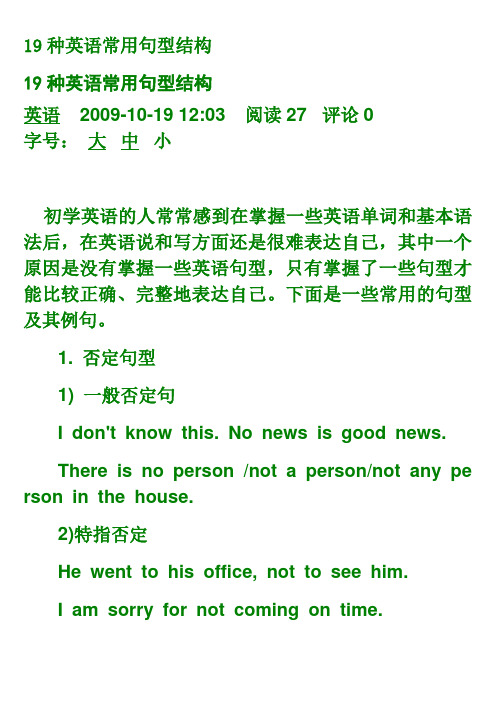
19种英语常用句型结构19种英语常用句型结构英语 2009-10-19 12:03 阅读27 评论0字号:大中小初学英语的人常常感到在掌握一些英语单词和基本语法后,在英语说和写方面还是很难表达自己,其中一个原因是没有掌握一些英语句型,只有掌握了一些句型才能比较正确、完整地表达自己。
下面是一些常用的句型及其例句。
1. 否定句型1) 一般否定句I don't know this. No news is good news.There is no person /not a person/not any pe rson in the house.2)特指否定He went to his office, not to see him.I am sorry for not coming on time.I don't think/believe/suppose/feel/imagine you are right.3)部分否定I don't know all of them.I can't see everybody/everything.All the answers are not right.(并非所有答案都对。
)All is not gold that glitters. (闪光的不一定都是金子。
)Both of them are not right.(并非两人都对。
)4)全体否定None of my friends smoke.I can see nothing/nobody.Nothing can be so simple as this.Neither of them is right.5) 延续否定You didn't see him, neither/nor did I.You don't know, I don't know either.He doesn't know English, let alone/to say n othing of/not to speak of French.6) 半否定句We seldom/hardly/scarcely/barely hear such f ine singing.I know little English.I saw few people.7) 双重否定You can't make something out of nothing.What's done cannot be undone.There is no sweet without sweat.No gain without pains.I can't help /keep/ laughing whenever I hear it.No man is so old but (that) he can learn.8)排除否定Everyone is ready except you.He did nothing but play.But for your help, I couldn't do it.9)加强否定I won't do it at all.I can't see it any more.He is no longer a boy.2. 判断句型1) 一般判断句It is important for us to learn English. It is kind of you to help me.Sincere means honest.The boy is called/named Tom.We regarded/considered it as an honor.2)强调判断It is English that we should learn.It is he who helped me a lot.3)弱式判断Your sentence doesn't sound/look/appear/feel right.You look/seem as if/as thought you had bee n there before.Maybe/Perhaps/ she is ill.He is probably ill.He is likely ill.It is possible that he is late4) 正反判断That sounds all right, but in fact it is not.5) 互斥判断He or you are wrong.Either he is right or I am.6) 注释判断He is a walking dictionary, that is (to say), he can remember many English words.7) 比较判断It is more a picture than a poem.Incomplete knowledge of style is worse than useless.3. 祝愿祈使句式1) 一般句式Study hard and keep fit.Be brave! Don't be shy!Get out of here.2)强语式Do tell me.Never tell a lie.3) 委婉祈使句Please tell me the true.Would/Will/Won't do me a favor?Would/Do you mind my smoking?What/How/ about going there on foot?4)建议祈使句Let us go. Let us know the time.Don't let the fire out.Let's not waste the time.You'd better start early.Shall we listen to some music?Why don't you get something to drink?I suggest we (should) take the train.Suppose/supposing you pick me up at abou t six?5)祝愿句Success to you!Wish you a good journey.Here's to your success!May you have a happy marriage.Allow me to propose a toast to our friendsh ip!4. 感叹句型How well he speaks!How kind she is!What nice weather it is!What a beautiful day!Here he comes!Such is life!Wonderful!Help! (救命啊!)5. 疑问句型1) 一般疑问句Is he a doctor?Do you the way to the station?2)反意疑问句He is a teacher, isn't he?It is quite cheap, don't you think?3) 特殊疑问句What is the distance / width/ size / populati on / temperature / fare?Who is he?What is he?(他是干什么工作的?)What is he like?How/Where is he?How do you like him?What do you think of him?What ever do you mean by saying this?4)选择疑问句Is he a doctor or a nurse?Do you love it or not?5)间接疑问句Do you know how old he is?Tell me if (whether) you like it.What do you think/say/suppose I should do?6.数词句型1) 表数目It is exactly ten o'clock.It is five miles away from here.He is more than/over/ at least not less than 20.He is under/at most/no more than 20.2)表年月日He was born on April 22, 1994/in 1994/on th e morning of October 1.3)表年龄He is 20 years old. = He is 20 years of age.He is at the age of 10.4)表倍数It is four times that of last years.This is four times as big (again) as that one.This is four times bigger than that one.The income is double what it was.The output of coal was 200% greater than i n 1998.5)表计量It is 10 meters long/wide/high.It costs me 100 yuan. / It is worth 100 yuan.I spent 10 hours to finish it.It took me 10 days to finish it.7. 关联指代句型1)两项关联I have two books, one is Chinese; the other English.I have five books, one is Chinese; the other s English.To say is one thing, but/and/ to do is anoth er.One the one hand, I am your teacher, and o n the other hand, I am also you friend.Some like to play football, others are fond o f basketball.2)先后顺序First/firstly, I wish good health, second/seco ndly success in your study, third/thirdly good lu ck in everything.First stop, then look, finally cross.At first/in the beginning/ he word hard. Late r/Afterwards he is not so diligent.3)修饰限制This is the same book as I lost yesterday. (不是同一本书,但书名、内容等相同)This is the same book that I lost yesterday. (同一本书)Don't trust such a man as over praise you. He/One/Those/They who should come failed to a ppear.A man/A person/The one/Anyone/People who saw her liked her very much.The day/time/moment will come when China is strongest in the world.4) 两项连接He can speak not only English but also Fre nch.The book is both interesting and instructive.It is neither cold nor hot.Please either come in or go out.The old worker has experience and knowled ge as well.5)加和关系Besides literature, we have grammar and wri ting.Apart from oxygen, there are some other ga ses in the air.In addition to 'if', there are many other conj unctions that can introduce conditional clauses.I must go now, incidentally, if you want that book.You seem to like tea, so do I.8. 比较句型1)等比句He is as tall as I.He is the same height as I.She is no less diligent than he.The lab is no better than a cottage.2) 差比句I speak English worse than he does. / He is not so/as tall as I am.Our knowledge is much inferior to their.3) 极比句He is the tallest of all in the class.None/No one/ is so blind as those that won' t see.Nothing is so easy as this.4)比例句The more a man knows, the more he feels his ignorance.5) 择比句He is taller than any other boy in the class.It is better late than never.They would die than live as slaves.He prefers doing to talking.He prefers to do rather than to talk.He prefers mathematics to English.I'd rather stay here.6)对比句You think me idle, but on the contrary, I am busy.They are working hard while you are wastin g your time.9.比喻类句型We must work like him.He behaves as his father does.He speaks English as if/ as though he was a foreigner.10.条件假设句1) 一般事实If we succeed, what will the people say?Suppose it rains, what shall we do?Persevere and you'll succeed.2)虚拟条件句If I were you, I would go.If you had seen it, you would have been m oved.3)反条件句Unless you try, you'll never succeed.Don't move, or/else/otherwise I'll shot.4)唯一条件句If only I have another chance, I shall do bet ter.Only in this way can we learn English well.So/As long as we don't lose heart, we'll suc ceed.5)推论条件句Since that is so, there is no more to say.Now that you are grown up, you must stop this behavior.19种英语常用句型结构发送到手机 | 收藏全屏阅读模式字体:小 | 大19种英语常用句型结构 (/bbs/dispbbs.asp?boardid= 12&id=205356)初学英语的人常常感到在掌握一些英语单词和基本语法后,在英语说和写方面还是很难表达自己,其中一个原因是没有掌握一些英语句型,只有掌握了一些句型才能比较正确、完整地表达自己。
最新英语语法句子释义
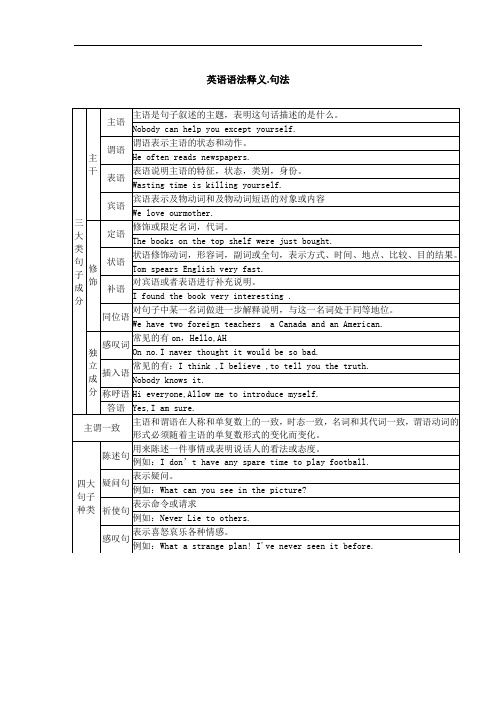
时间状语从句
引导词:When,as,while,before,after,since,until.
地点状语从句
引导词:Where,wherever.
原因状语从句
引导词:Beacuse,since,for,as,in that.
结果状语从句
引导词:So,such,that.
目的状语从句
引导词:So that,in order that.
疑问句
表示疑问。
例如:What can you see in the picture?
祈使句
表示命令或请求
例如:Never Lie to others.
感叹句
表示喜怒哀乐各种情感。
例如:What a strange plan! I've never seen it before.
英语语法释义.句法
两大句子结构
三大类句子成分
主干
主语
主语是句子叙述的主题,表明这句话描述的是什么。
Nobody can help you except yourself.
谓语
谓语表示主语的状态和动作。
He often reads newspapers.
表语
表语说明主语的特征,状态,类别,身份。
Wasting time is killing yourself.
补语
对宾语或者表语进行补充说明。
I found the book very interesting .
同位语
对句子中某一名词做进一步解have two foreign teachers a Canada and an American.
独立成分
感叹词
常见的有on,Hello,AH
六级常见的表达句式 批注版

CET-6观点结论句、末尾句:倒装句:Only in this way can we make greater progress i n the future.只有这样做,我们今后才能做出更大的进步The need of the society an individual interest are equally important to us.Only if the tow aspects are perfectly connected can a man show his talents and abilities to the best advantage.社会发展和个人兴趣同等重要,只有将两者完美结合的人才能充分展示只自己的才华Only by aquiring plenty of new kownledge can we adapt ourselves to the constantly changing world and contribute to the development of the society.只有。
,我们才能适应这个不断变化的社会,并且为之做出贡献好处:Obviously,it is teamwork t hat make it possible for them to go anywhere they want. 观点结论句:(某个观点的意义)正是。
使得我们得以做。
It is preseverence that keeps us doing something valuable and admirable in spite of difficulties and dicouragement.观点结论句:正是。
使得我们能坚持做一些有价值,值得尊敬的事情。
The cultural exchange plays a vital role in maintaining the peace of the world .(in individual success).论点、论据:。
英语中几大基本句型

英语中几大基本句型英文的五个基本句型:1. 主语+系动词+表语例句:Learning English is important. 学习英语很重要。
The music sounds nice. 这音乐很好听。
系动词:又叫连系动词,起连接主语和后边的成分的作用。
这种动词后面所接的成分是用于说明主语的特点,表明主语性质特征。
例如:The music sounds nice. 其中sound是系动词,nice是用来表示主语特征的,称为表语,位于系动词之后。
在英语中,除了be动词以外,还有以下系动词:1)表示主语特征状态的,如:feel/look/sound/taste/smell/seem/appear…2) 表示主语由一种状态转变为另一种状态的,如:become/fall/go/grow/turn/get/come…3) 表示主语保持或继续某种状态的,如:continue/remain/stay/keep/hold/rest/prove…2. 主语+谓语这个结构中的谓语由不及物动词或短语充当,谓语动词后面常跟状语,来修饰动词,说明动作的程度、发生的地点或时间等等。
例句:He died two years ago. 他两年前死了。
The sun rises in the east and sets in the west. 太阳东升西落。
不及物动词:词典中的注释vi.。
这种动词所表示的动作没有作用对象,其本身意思完整,其后不需要带宾语。
例如:He died.(die是不及物动词,“死”这个动作就只是自主完成,并没有作用对象。
)3. 主语+谓语+宾语该结构中的谓语由及物动词或短语充当。
例句:You have beautiful eyes. 你有美丽的眼睛。
She put the glass down carefullly. 她小心翼翼地放下玻璃杯。
及物动词:词典中的注释vt.。
这种动词告诉我们由主语发出的动作所作用的对象是什么,所作用的对象称之为宾语。
高一英语句型及例句摘抄及解析
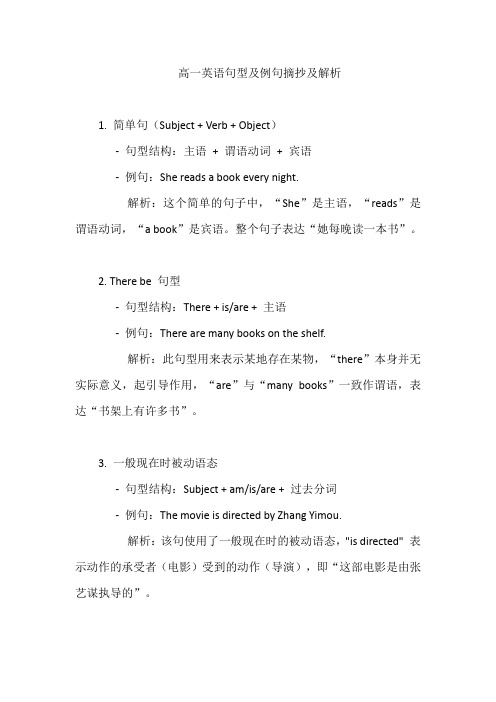
高一英语句型及例句摘抄及解析1. 简单句(Subject + Verb + Object)- 句型结构:主语+ 谓语动词+ 宾语- 例句:She reads a book every night.解析:这个简单的句子中,“She”是主语,“reads”是谓语动词,“a book”是宾语。
整个句子表达“她每晚读一本书”。
2. There be 句型- 句型结构:There + is/are + 主语- 例句:There are many books on the shelf.解析:此句型用来表示某地存在某物,“there”本身并无实际意义,起引导作用,“are”与“many books”一致作谓语,表达“书架上有许多书”。
3. 一般现在时被动语态- 句型结构:Subject + am/is/are + 过去分词- 例句:The movie is directed by Zhang Yimou.解析:该句使用了一般现在时的被动语态,"is directed" 表示动作的承受者(电影)受到的动作(导演),即“这部电影是由张艺谋执导的”。
4. 现在完成时- 句型结构:Subject + have/has + 过去分词- 例句:I have studied English for five years.解析:本句使用现在完成时态,表达从过去某个时间开始到现在为止的动作或状态持续存在,即“我已经学了五年英语”。
5. 条件状语从句(If 引导)- 句型结构:If + 主语+ present simple, subject + will + 动词原形(future simple)- 例句:If it rains tomorrow, we will stay at home.解析:这是一个由if引导的条件状语从句,主句使用将来时态,从句使用一般现在时表示未来可能发生的假设情况,意为“如果明天下雨,我们将待在家里”。
科普版三年级英语下册英语课文语法注释
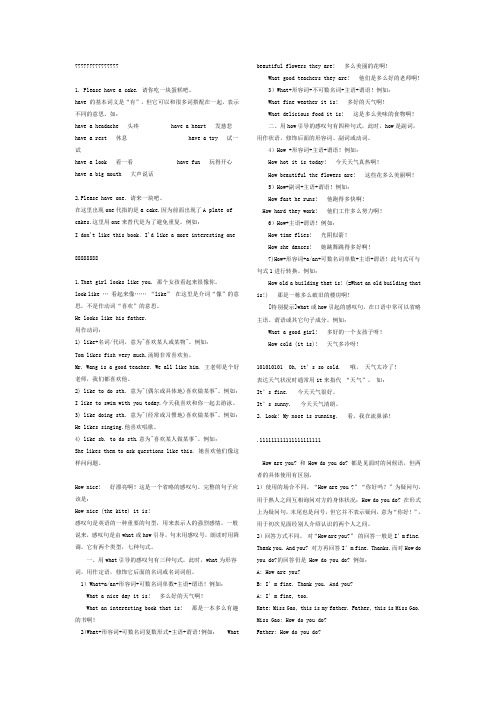
7777777777777771. Please have a cake. 请你吃一块蛋糕吧。
have 的基本词义是“有”,但它可以和很多词搭配在一起,表示不同的意思。
如:have a headache 头疼 have a heart 发慈悲have a rest 休息 have a try 试一试have a look 看一看 have fun 玩得开心have a big mouth 大声说话2.Please have one. 请来一块吧。
在这里出现one代指的是a cake.因为前面出现了A plate of cakes.这里用one来替代是为了避免重复。
例如:I don't like this book.I'd like a more interesting one888888881.That girl looks like you. 那个女孩看起来很像你。
look like …看起来像……“like”在这里是介词“像”的意思,不是作动词“喜欢”的意思。
He looks like his father.用作动词:1) like+名词/代词,意为"喜欢某人或某物"。
例如:Tom likes fish very much.汤姆非常喜欢鱼。
Mr. Wang is a good teacher. We all like him. 王老师是个好老师,我们都喜欢他。
2) like to do sth. 意为"(偶尔或具体地)喜欢做某事"。
例如:I like to swim with you today.今天我喜欢和你一起去游泳。
3) like doing sth. 意为"(经常或习惯地)喜欢做某事"。
例如:He likes singing.他喜欢唱歌。
4) like sb. to do sth.意为"喜欢某人做某事"。
Unit 3知识点精析(下)+课文注释人教版英语八年级下册

人教版丨初中英语八年级下册Unit 3知识点精析(下)+课文注释1.invite my friends to a party邀请我的朋友们来参加聚会要点精析invite为及物动词,意为“邀请”。
invite sb.to do sth.意为“邀请某人做某事”。
例:We invited all our friends.我们邀请了我们所有的朋友。
Kate invited me to go to the movies with her.凯特邀请我和她一起去看电影。
知识拓展invite 的名词形式为invitation,意为“邀请;请帖”。
例:Thank you for your kind invitation.谢谢你的盛情邀请。
2. I do not understand why some parents make their kids help with housework and chores at home.我不理解为什么一些父母让他们的孩子在家帮忙做家务。
要点精析make their kids help with housework and chores 是 make sb. do sth.结构,此结构意为“让/使某人做某事”。
例:This good news made her laugh happily.这个好消息使她开心地笑了。
3.Housework is a waste of their time.(做)家务是浪费他们的时间。
要点精析a waste of...意为“浪费……”,其中waste是名词,意为“浪费;滥用”。
例:Playing computer games is a waste of time.玩电脑游戏是浪费时间的。
知识拓展waste还可作动词,意为“浪费”。
例:Don't waste your money on clothes.别把你的钱浪费在衣服上。
4. They should spend their time on schoolwork in order to get good grades and get into a good university.为了取得好成绩,进入一所好大学,他们应该把他们的时间花在学业上。
自考英语 20190110 语法 时态(二) 注释

20190110 语法时态(二)一篇一篇文章理解,一句一句看懂,一个一个短语积累,一道一道题提高。
利用好配套Excel文档选自广东卷、全国卷、湖北卷、北京卷•不懂的题,多把句子读几遍,背诵。
语言无非是熟能生巧的过程。
•专注于具体的题。
勿迷失在语法概念上。
与考试不相关的语法概念不必细究。
•语法要重视知识点的积累,多在习题中体会。
过去现在将来时一般进行完成时一般时态一、一般现在时1. 表示经常发生的动作或存在的状态常和always, usually, often, sometimes, every day, every week等连用例:He goes to work every day. 他每天去上班2. 表示普遍的真理由于是众所周知的客观事实,所以一般不用时间状语He said the earth is round. 他说地球是圆的。
3. 在时间、条件状语从句中表示将来的动作,遵循“主将从现”的原则常用的标志性引导词有as soon as, when, until, if, unless, once, the moment(1) If it ____ tomorrow, we won't go for a picnic. (北京201411)A. will rainB. should rainC. rainsD. rained(2) If it ____ tomorrow, the basketball match has to be canceled. (北京201311)A. rainB. rainsC. rainedD. will rain4. 在the+比较级,the+比较级(越…越…)句型中,若主句是将来时,从句通常用现在时。
The harder you study, the better results you will get. 你越努力学习,结果也会越好。
二、一般过去时1. 表示过去的动作或状态常和具体的过去时间连用,如just now, last year, when I was 18 years old(1) When George was a little boy in primary school, he often ____ to school on foot. (北京201405)A. goesB. wentC. goD. will go2. used to do sth. 表示过去常常做......例. I used to take a walk in the morning. 我过去常常早晨散步(意味着现在不再早晨散步了)三、一般将来时1. will (shall) + 动词原形:表示将来的动作或状态He will come and help you. 他会来帮助你的。
人教版英语七年级下册Unit2知识点精析+课文注释

人教版英语七年级下册Unit2知识点精析+课文注释Section A重点单词dress穿衣服;连衣裙up向上brush刷;刷净;刷子tooth牙齿shower淋浴;淋浴器(间)usually 通常地;一般地forty 四十never从不;绝不fifty五十early早(的)job工作;职业work工作o'clock(表示整点)……点钟station电(视)台;车站night晚上;夜晚funny 奇怪的;滑稽好笑的exercise锻炼;练习best最好的;最好地;最group组;群重点短语get up起床;站起go to school去上学get dressed 穿上衣服brush teeth 刷牙eat breakfast 吃早饭take a shower 洗淋浴radio station 广播电台at night 在晚上go to work 去上班be late for 迟到on weekends (在)周末重点句型1.-What time do you usually get up,Rick?里克,你通常几点起床?-I usually get up at six thirty.我通常6:30起床。
2.I never get up so early.我从不那么早起床。
3.That's funny time for breakfast!那个时间吃早饭真有意思呀!4. After that, I usually exercise at about ten twenty.在那之后,我通常在10:20左右锻炼。
Section B重点单词half一半;半数past晚于;过(时间);过去的quarter一刻钟;四分之一homework家庭作业clean打扫;弄干净;干净的run跑;奔walk行走;步行quickly 很快地either或者;也(用在否定词组后)lot大量;许多sometimes有时taste有……的味道;品尝;味道;滋味life生活;生命重点短语do(one’s) homework做作业go to bed 上床睡觉take a walk 散步;走一走play sports 做运动get home 到家either...or... 要么......要么......;或者......或者......lots of 大量;许多from...to...从......到......重点句型1.When do students usually eat dinner?学生们通常什么时候吃晚饭?2. In the evening, I either watch TV or play computer games.在晚上,我要么看电视,要么玩电脑游戏。
英语十四个句型
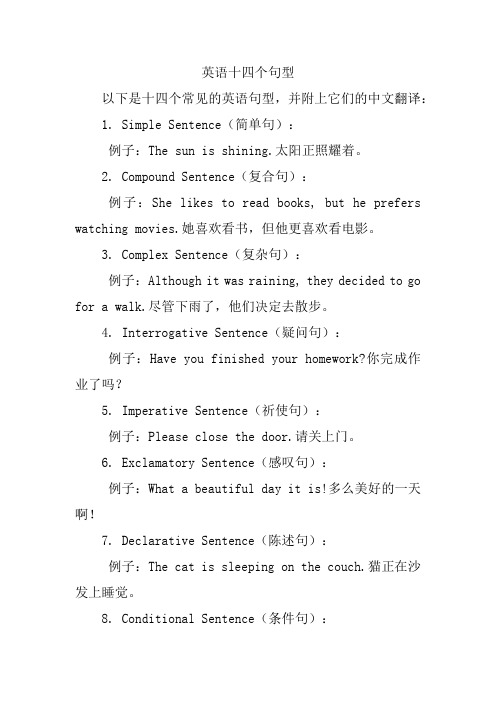
英语十四个句型以下是十四个常见的英语句型,并附上它们的中文翻译:1. Simple Sentence(简单句):例子:The sun is shining.太阳正照耀着。
2. Compound Sentence(复合句):例子:She likes to read books, but he prefers watching movies.她喜欢看书,但他更喜欢看电影。
3. Complex Sentence(复杂句):例子:Although it was raining, they decided to go for a walk.尽管下雨了,他们决定去散步。
4. Interrogative Sentence(疑问句):例子:Have you finished your homework?你完成作业了吗?5. Imperative Sentence(祈使句):例子:Please close the door.请关上门。
6. Exclamatory Sentence(感叹句):例子:What a beautiful day it is!多么美好的一天啊!7. Declarative Sentence(陈述句):例子:The cat is sleeping on the couch.猫正在沙发上睡觉。
8. Conditional Sentence(条件句):例子:If it rains, we will stay indoors.如果下雨,我们会呆在室内。
9. Passive Voice Sentence(被动语态句):例子:The cake was baked by Mary.蛋糕是玛丽烤的。
10. Direct Speech Sentence(直接引语句):例子:She said, "I will be there at 5 o'clock."她说:“我会在5点钟到那里。
英语中解释说明的句型

英语中解释说明的句型1. This is a pen.2. That is my book.3. These are your keys.4. Those are her shoes.5. Here is a picture of my family.6. There are three apples on the table.7. How many students are in the classroom?8. The dog is in the garden.9. The cat is under the table.10. We are going to the park.11. I have two brothers and one sister.12. Are there any oranges in the fridge?13. I would like to order two sandwiches and a coke.14. She is wearing a red dress and black shoes.15. There is a big tree in front of the house.16. Can you pass me the salt and pepper, please?17. Is there a post office near here?18. The children are playing in the backyard.19. Do you have any friends in this city?20. Have you seen my glasses anywhere?21. The car is parked in front of the garage.22. Are there any snacks in the pantry?23. I need to buy some milk and eggs at the store.24. There are two chairs in the living room.25. The books are on the shelf in the library.26. I have a dog and a cat as pets.27. There are six eggs in the carton.28. How many pencils do you have?29. The birds are chirping outside the window.30. Your glasses are on the nightstand.31. There are many fish in the aquarium.32. Can you bring me a glass of water?33. Is there a pharmacy nearby?34. The shoes are in the closet.35. I would like to buy a dozen eggs.36. Do you have any plans for the weekend?37. There are four seasons in a year.38. I need to pick up some bread and butter at the market.39. She has three cats and a dog as pets.40. The restaurant has a variety of dishes on its menu.41. The flowers are blooming in the garden.42. I need to find a good place to sit and read.43. There are seven days in a week.44. How many chairs are there in the dining room?45. The children are playing in the park.46. There are five people in the room.47. She has a collection of stamps from different countries.48. There are eight planets in our solar system.49. Can you get me a cup of coffee, please?50. Is there a post office in this neighborhood?51. I can speak English, Spanish, and French.。
英语注释部分句型
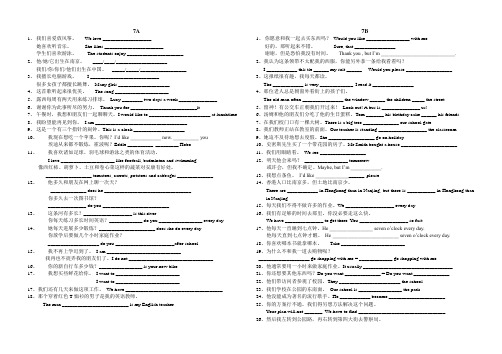
7A1、我们喜爱放风筝。
We love ___________________.她喜欢听音乐。
She likes _______________________.学生们喜欢游泳。
The students enjoy ______________________.2、他/她/它出生在南京。
____/____/____________________.我们/你/你们/他们出生在中国。
_____/_____/__________________.3、我擅长电脑游戏。
I ___________________________.很多女孩子都擅长跳舞。
Many girls ____________________.4、这首歌听起来很优美。
The song _____________________.5、露西每周有两天用来练习排球。
Lucy ________ two days a week _______________.6、谢谢你为此事所尽的努力。
Thank you for __________________________it.7、午餐时,我想和朋友们一起聊聊天。
I would like to ________________________ at lunchtime8、我盼望能再见到你。
I am ____________________________________.9、这是一个有三个指针的闹钟。
This is a clock ____________________.10、我现在想吃一个苹果。
你呢?I’d like ____________ now. __________ you埃迪从来都不锻炼,霍波呢?Eddie __________. _________ Hobo11、我喜欢诸如足球、羽毛球和游泳之类的体育活动。
I love _____________________ like football, badminton and swimming.像西红柿、胡萝卜、土豆和卷心菜这样的蔬菜对安康有好处。
60个英语特殊句、疑难句
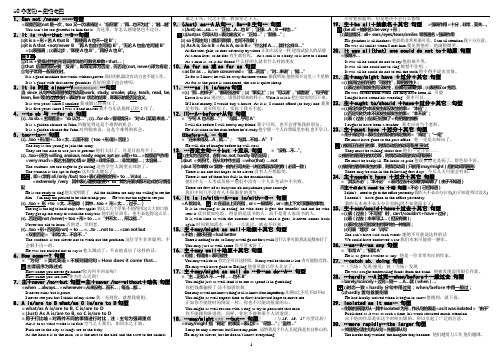
all+抽象名+ 强调作用=十分,非常,至关… 19.主+be all+抽象名+其它 句型 =强调作用=十分,非常,至关…。 =(Just) as…,so…=“正如…A…也 B”“正像…A,B 一样也…” as…,so… 正如… ; 正像… 一样也…” 注⑴be all +抽象名≥be very +形; +抽象名≥ +形 抽象名 某些情况: 等普通名= 引导从句=表比喻含义= 正如…” 就像…” ⑵某些情况:all+ ears /eyes/tears/smiles 等普通名=强调作用 注⑴(Just)as 引导从句=表比喻含义=“正如…”“就像…” ; ; His grandma is all kindness.他奶奶非常和蔼可亲。I am all attention.我十分注意。 引导主句(谓语可倒装,也可不倒装) 2.It is …A…that …B…句型 ⑵ so 引导主句(谓语可倒装,也可不倒装) +形 He was all smiles when I met him.我见到他时,他满脸微笑。 B= ⑴it is a +形+名 A that B “即使再 A 也不一定 B” ; ⑶ As A is, So is B =As is A, so is B=“什么样 A…,就什么样 B…” 也会(也可能) B” 也会/ As fire tries gold, so does adversity try virtue.正如火试金一样,逆境试验人的品德 20. to+ ⑵it is A that +not/never B “再 A 也会(也可能) B”“无论 A 也会/也可能 B” , 20.It was all(that) one could do
- 1、下载文档前请自行甄别文档内容的完整性,平台不提供额外的编辑、内容补充、找答案等附加服务。
- 2、"仅部分预览"的文档,不可在线预览部分如存在完整性等问题,可反馈申请退款(可完整预览的文档不适用该条件!)。
- 3、如文档侵犯您的权益,请联系客服反馈,我们会尽快为您处理(人工客服工作时间:9:00-18:30)。
7A1、我们喜爱放风筝。
We love ___________________.她喜欢听音乐。
She likes _______________________.学生们喜欢游泳。
The students enjoy ______________________.2、他/她/它出生在南京。
____/____/____________________.我们/你/你们/他们出生在中国。
_____/_____/__________________.3、我擅长电脑游戏。
I ___________________________.很多女孩子都擅长跳舞。
Many girls ____________________.4、这首歌听起来很优美。
The song _____________________.5、露西每周有两天用来练习排球。
Lucy ________ two days a week _______________.6、谢谢你为此事所尽的努力。
Thank you for __________________________it.7、午餐时,我想和朋友们一起聊聊天。
I would like to ________________________ at lunchtime8、我盼望能再见到你。
I am ____________________________________.9、这是一个有三个指针的闹钟。
This is a clock ____________________.10、我现在想吃一个苹果。
你呢?I’d like ____________ now. __________ you?埃迪从来都不锻炼,霍波呢?Eddie __________. _________ Hobo?11、我喜欢诸如足球、羽毛球和游泳之类的体育活动。
I love _____________________ like football, badminton and swimming.像西红柿、胡萝卜、土豆和卷心菜这样的蔬菜对健康有好处。
__________________ tomatoes, carrots, potatoes and cabbages ______________.12、他多久和朋友在网上聊一次天?______________ does he __________________________________?你多久去一次图书馆?_______________ do you __________________________?13、这条河有多长?___________________ is this river?你每天练习多长时间英语?_____________ do you _________________ every day? 14、她每天进行多少锻炼?______________________ does she do every day?你放学后要做几个小时家庭作业?____________________ do you _______________________after school?15、我不再上学迟到了。
I am _____________________________.我再也不捉弄我的朋友们了。
I do not _________________________________.16、你的新自行车多少钱?_________________ is your new bike?17、我想买些鲜花给你。
I want to _________________________.I want to _________________________.17、我们还有几天来做这项工作。
We have ______________________________________.18、那个穿着红色T恤衫的男子是我的英语老师。
The man __________________________ is my English teacher.7B1、你愿意和我一起去买东西吗?Would you like _________________ with me?好的,那听起来不错。
Sure, that ________________.谢谢,但是恐怕我没有时间。
Thank you , but I’m _____________________________.2、我认为这条领带不太配我的西服,你能另外拿一条给我看看吗?I ____________ this tie ______ my suit ______. Would you please __________________?3、这报纸很有趣,我每天都读。
The ____________ is very _____________. I read it ________________.4、那位老人总是朝窗外看街上的孩子们。
The old man often ________________ the window ______ the children _____ the street.5、当心!有公交车正朝我们开过来!Look out! A bus is _______________ us!6、汤姆和他的朋友们分吃了他的生日蛋糕。
Tom _______ his birthday cake ______ his friends.7、在我们校门口有一棵大树。
There is a big tree ______________ our school gate.8、我们老师正站在教室的前面。
Our teacher is standing ___________________ the classroom.9、她迫不及待地想去度假。
She __________________ go on holiday.10、史密斯先生买了一个带花园的房子。
Mr Smith bought a house ______________________.11、我们用眼睛看。
We see __________________.12、明天他会来吗?_________________ tomorrow?或许会,但我不确定。
Maybe, but I’m ____________.13、我想点条鱼。
I’d like ___________________, please.14、香港人口比南京多,但土地比南京少。
There are ____________ in Hongkong than in Nanjing, but there is ___________ in Hongkong than in Nanjing.15、每天我们不得不做许多的作业。
We ___________________ every day.16、我们有足够的时间去那里。
你没必要走这么快。
We have _______________ to get there. You ___________________ so fast.17、他每天一直睡到七点钟。
He _________________ seven o’clock every day.他每天直到七点钟才醒。
He __________________________ seven o’clock every day.18、你喜欢哪本书就拿哪本。
Take _________________________.19、为什么不和我一道去购物呢?____________________ go shopping with me? = _____________ go shopping with me?20、他通常要用一小时来做家庭作业。
It usually ___________________________________.21、你还想要其他东西吗?Do you want ______________? = Do you want ______________?22、他们带访问者参观了校园。
They ________________________ the school.23、我们学校在公园的东南面。
Our school is _________________ the park.24、他没能成为著名的流行歌手。
He ____________ become ______________________.25、你的计划行不通。
我们得另想办法解决这个问题。
Your plan will not _______. We have to find __________________________________.26、然后我左转到公园路,再右转到第四大街去警察局。
Then I’ll ______________ Park Road and _______________ Fourth Street to the police station.27、我对踢足球感兴趣。
I am _______________________ football.听到这么好的消息我很高兴。
I am quite __________________ hear _________________.28、老师要求学生上课注意听讲。
The teachers asked the students ________________________.29、他正穿过街道。
He is ________________ the street. = He is __________ the street.30、我们穿过市场来到公园。
We __________________ the market to ____________________.31、穿过树林_______________ the woods 通过窗子进来__________________ the window游过水池________________ the pool 穿过沙漠_______________ the desert32、问路的几种表达法:Can you tell me ______________?=Can you tell me _____________________________?Can you tell me ______________________?= Can you tell me _______________________?Excuse me, ______________?33、快要下雨了。
